How AI-Powered ERP Software Are Raising Record Funding in 2025
One of the most robust signs in the business technology space in 2025 is the greed of the investors for the AI-powered ERP software. What was once known as the back-office software has turned into an intelligent control center fueled by intelligent automation, predictive analytics, and real-time decision-making.
The tipping point arrived in the form of an onslaught of funding rounds, such as DualEntry’s $90 million Series A round, that highlighted how investors no longer perceive ERP as administrative software but as the digital spine of contemporary enterprises. Fueled by AI at its center, ERP systems are evolving away from data recorders into independent decision machines that learn, forecast, and act.
In the likes of Qatar, such a redefine becomes of key importance. With the nation speeding up its Vision 2030 diversification strategy, businesses search for technology higher than digitization, to systems of thinking. Top-notch ERP software with AI occupies a position that is capable of consolidating finance, supply chain, HR, and compliance processes, and can power intelligence-based growth.
This article explains how ERP software based on AI has been making all-time investments, how it’s transforming the GCC business, and why Qatari companies can no longer consider ERP as just an IT system, but must consider it to be the first choice driver of growth.
Funding Boom: What’s Driving Investor Interest in AI-ERP
Investments in AI-driven ERP software exploded on a recent wave that wasn’t accidental, but a proof point that investors and businesses alike are transforming business intelligence in a new way. In 2025, it was the year when becoming the leading ERP software market was the war to be fought on decision-making, data, and automation.
1. From Data Storage to Decision Intelligence
Legacy ERP Software to post transactions, invoices, and inventory. However, AI-driven ERPs have been built with reasoning in mind. AI-infused ERPs can analyze the workflow, detect inefficiencies, and offer real-time corrective suggestions.
2. Post-Pandemic Digital Momentum
The pandemic hastened the GCC’s digitalization at record velocities. Qatari, Saudi, and UAE companies no longer debate Whether they automate, but How they might possibly automate smartly.
This maturity has also introduced AI-driven solutions that can offer predictive forecasting, inter-departmental analysis, and proactive compliance, all essential concerns present systems can’t solve.
3. The Cloud Advantage
The shift to cloud-native ERP software from on-premise ERP software facilitates it to be utilized by AI. The business houses do not need to invest in massive infrastructure, can utilize the AI modules as and when required, can scale by locations, and can access the insights anywhere and anytime.
They see it as a pattern of sustainable growth, repeat revenue, rapid deployment, and scalable globally.
4. The GCC Factor
Following Qatar Vision 2030 support for hydrocarbon diversification, manufacturing, logistics, hospitality, and construction companies require more sophisticated, data-centric ERP solutions.
Compliance-oriented local AI-ERP vendors, ZATCA-style regulations, and Arabic-English bilingual workflow applications earn the first-investment-priority tag.
The Challenges and Problems in Adopting AI-Guided ERP in Qatar
Although AI-driven ERP software has transformative advantages, Qatari businesses must manage implementation issues in the proper way to deliver ROI as a whole.
Data Quality and Integration
AI depends on clean, undamaged data. The majority of firms still have isolated legacy systems or combined data entry systems. Migrating old files and making sure there is real-time integration between finance, HR, and the supply chain is paramount.
Workforce Readiness and Change Management
ERP rollout using AI requires adaptation by staff in work procedures. Training staff, job redefinition, and becoming a data society are critical in an effort to prevent resistance and allow for optimal utilization.
Regulatory Compliance and Data Protection
Qatar’s sophisticated regulatory framework, such as its value-added tax law and its data protection law, requires that deployments of AI-ERP systems are designed for day-one functionality. Apart from that, businesses require secure cloud storage, access controls, and security controls.
Cost and ROI Measurement
While reducing the expense of infrastructure, installation, customizations, and ongoing AI module fees must be well planned. Firms must go for ROI analysis in phases to spend only after estimated efficiency improvements.
Supplier Selection and Domestic Support
Bilingual support (English-Arabic), in-country supporting infrastructure, and local market understanding help a lot in supplier selection. It brings successful roll-outs, rapid trouble shooting, and industry-specific process satisfaction.
How AI-Driven ERP Is Transforming Business Operations in Qatar
AI is no longer supporting ERP, it assumes the very position of being at the forefront of spearheading the manner in which enterprises plan, execute, and automate each process. In Qatar, whose industries are digitized diversification and resiliency, softwares with AI-ERP are transforming the manner in which leaders perceive efficiency and growth.
1. Predictive Business Management
AI-ERP technology empowers organizations to transform into proactive firms.
Rather than waiting for monthly reports, operations brains and CFOs can gain real-time insights into cost trends, worker productivity, and demand uplift.
As an example, a Doha-based construction firm can identify procurement delay opportunities ahead of time and continually invoke supplier contingencies with the aid of AI forecasting models.
2. Saber Control Financiero
AI-ERP Software with Qatar’s focus on compliance and transparency allow financial administration, ledger reconciliations, cash flow gap forecasting, and real-time tracking of expenses to be done automatically.
They free finance departments from focusing on postings manually.
AI allows Qatar Financial Centre (QFC) regulations to be implemented with audit trails and reporting compliances incorporated.
3. Scalability to Facilitate Multi-Entity and Multi-Location Operations
Qatari conglomerates also typically extend over a number of subsidiaries and geographies, ranging from Ras Laffan supply chain to Lusail retail.
Improved ERP software consolidates this data from these silos into one place so that the executive leadership gets the luxury of observing one financial and operating reality.
It removes duplication, streamlines approvals, and enables quicker board-level decisions.
4. AI-Driven Workforce Optimization
Human resource and manpower management are observed to function as strategic drivers to operational effectiveness in the ever-evolving Qatari labor market.
Artificial intelligence of ERP software forecasts manpower needs, automates payrolls to Wage Protection System levels, and defines performance trends which govern promotion or training.
It maximizes productivity as well as aligns the workforce plan with Qatar Vision 2030 nationalization goals.
5. Risk Intelligence and Compliance
Qatar’s new VAT and data protection regimes call for wise governance.
ERP software with artificial intelligence can update itself to keep up with VAT law amendments, generate GTA-compatible reports, and even spot anomalies that may signal compliance risk.
The outcome: reduced penalties, quicker audits, and more operations credibility.
Why Investors and Qatari Enterprises’ Next Giant Bet on Investment Will Be AI-Powered ERP (2025–2030)
The AI-based ERP Software hype is not hype but value-focused business strategy. These platforms are being considered seriously by investors and Qatari businesses as well and are considered to be key growth drivers.
1. Revenue Maximization Based on Intelligent Insights
AI-ERP software automatically track real-time sales patterns, purchase cycles, and inventory turns and allow companies to cut wastage and discover profitable potential faster.
That translates into effective Qatari production and retail pricing, optimal inventory management, and quicker go-to-market programs with improved ROI.
2. Operative Agility
Such types of GCC markets are extremely volatile and business leaders require systems that can match their pace.
ERP by AI enables companies to test what-if scenarios, forecast surge in demand, and forecast resource allocation at unprecedented velocity.
e.g., A company in Doha is able to respond instantly to market peaks or impromptu import slumps without compromising control of operations.
3. Confidence of Investors
AI-boosted ERPs have quantified efficiency gains, lowered cost of operations, and increased rate of compliance.
They consider it a low-risk, high-growth investment, thus that much money was pumped in 2025.
AI-ERP-facilitated scale-ups and start-ups are finding venture capitalists more keen because of the potential in demonstrating hard KPIs, forward-looking stock management, automated compliance, and data-driven decision-making.
4. Future-Proofing Operations
AI deployments after 2030 would become imperative rather than an option.
Qatari firm investments in AI-ERP enjoy first-mover benefit with scalable and market-led operations in short-term and emerging regional regulations compliance.
5. Cross-Industry Applications
From commerce and industries to hotels and logistics, AI-ERP is leaving its mark on every industry.
Such dominance increases the investor appeal since many verticals can be addressed through a single AI-ERP solution with operating as well as growth leverage achieved simultaneously.
HostBooks: Delivering AI-Powered ERP to Qatar
As the global marketplace for AI-ERP keeps expanding in full strength, the hopes of Qatari businesses rested on HostBooks Enterprise to deliver actionable intelligence, real-time governance, and effective operations.
1. HB Zeno: Self-Governing AI in Action
HostBooks’ Agentic AI solution, HB Zeno, reveals nothing but optimizes, analyzes, and automates.
From procurement, inventory, finance, HR, to regulation, HB Zeno maintains the operation under its control and advises decision-makers prior to risks spiraling out of control.
2. Strategic Planning with Predictive Insights
HB Zeno foresees Qatari buyers, producers, and service providers with demand patterns, funding needs, and operation bottlenecks.
This allows the companies to allocate resources, schedule manufacturing, and stock control at different locations with full confidence.
3. Automated Optimization
HostBooks’ AI runs end-to-end and extends far beyond the dashboard to automate anything from reorder points in trade operations to procurement approval in manufacturing.
This minimizes interventions, minimizes human errors, and maximizes margins with zero overheads.
4. Simplified Compliance
With constantly changing rules in Qatar, HostBooks empowers businesses with the capability of being continuously compliant.
Automated reporting, real-time auditor readiness, and workforce management integrated give precision and local labor and finance convention compliance.
5. Industry Scalability
As a hospitality, retail, F&B, manufacturing, building and construction player, the AI-powered ERP in HostBooks scales up with the growing requirements of the industry without overcomplicating operations.
AI-Driven ERP in Qatar: Trends at Hand
As the use of AI-ERP gains traction in Qatar, entities will have to make investments in the trends of the future that will define next-gen digital transformation:
Hyper-Personalized AI Recommendations
Next-generation ERP systems will no longer then process data just, but also give real-time, function-specific recommendations to operations managers, HR heads, and CFOs.
To this degree, teams will make function-sensitive decisions wisely and easily.
Integrations with Future Technologies
ERP based on AI will also become more integrated with IoT, blockchain, and next-generation analytics systems.
That is, IoT-based sensors on shop floors can be linked to the ERP so that the production schedule itself gets adjusted automatically, and blockchain provides secure and transparent value chains.
Predictive and Prescriptive Compliance
Apart from generating reports, AI will also predict regulatory reforms, recommend policy reforms, and apply compliance steps independently.
That will keep Qatari companies in compliance with labor laws locally, VAT rules, and worldwide processes at all times.
Sustainability and ESG Integration
AI-ERPs will enable companies to monitor carbon footprint, energy usage, and ESG in real-time.
In green plan-covered industries of Qatar Vision 2030, such functionality will be more relevant.
AI Democratization around SMEs
While large organizations of the present era spearhead deployments in AI-ERP, technology component AI and cloud infrastructure shall also bring mid-sized and small Qatari organizations into the list of predictive analytics and automation with minimal upfront capital investment.
Why AI-Driven ERP Is a Strategic Imperative for 2025 Qatari Organizations
The most recent surge in the use of ERP with AI and largest investments in the year 2025 are clear indicators: those companies which install AI in the ERP software gain gigantic competitive benefits.
These are tangible and actual benefits to Qatari companies, such as predictive and real-time optimization to real-time management of operations and regulatory compliance. To have an ERP with AI is not technology, it’s future-proofing your company.
These types of companies can scale at multiple locations, maximize asset utilization, minimize operational risk, and make data-driven decision-making a breeze.
HostBooks Enterprise: A Future in the Qatari Marketplace
HostBooks Enterprise is a similar vision for the Qatari economy. Its Agentic AI, predictive analytics, and vertically integrated modules provide an all-encompassing system in which your finance, inventory, HR, procurement, and compliance are all interlinked in perfect synchronization.
No longer do businesses have to wrestle with countless tools, with HostBooks they can do smarter, better and faster.
Evolution of AI-Driven ERP Software
AI-Driven ERP Software is poised to evolve from voluntary upgrades to strategic imperatives by 2025. Qatari businesses that transition early will realize operational efficiencies, bring in profitability, and become leaders in their individual verticals.
Don’t wait to get disrupted, embrace AI-driven ERP today. Check out HostBooks Enterprise and make your Qatari operations the leaner and smarter future.



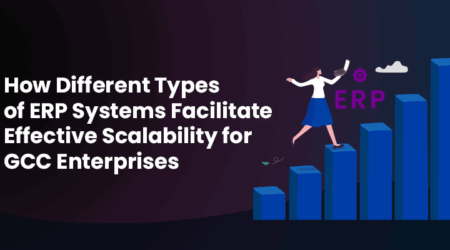
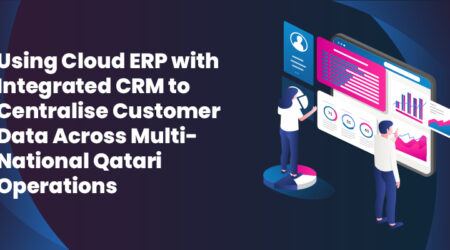
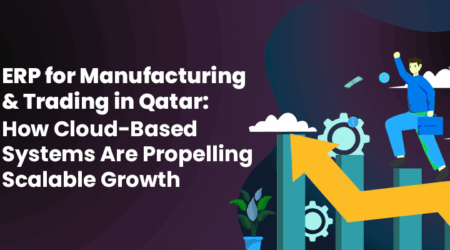
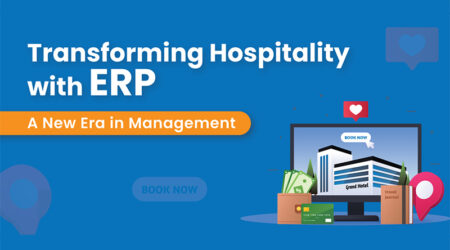
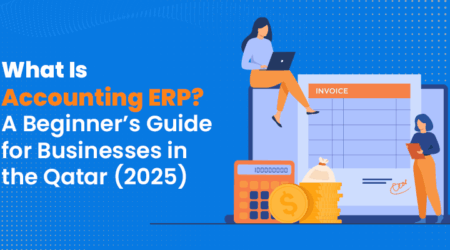
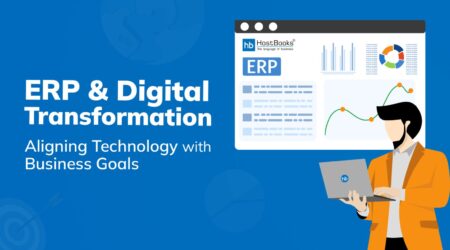
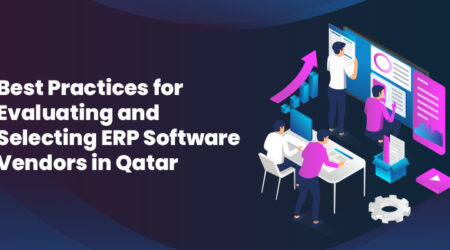
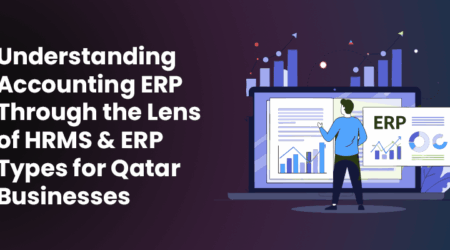
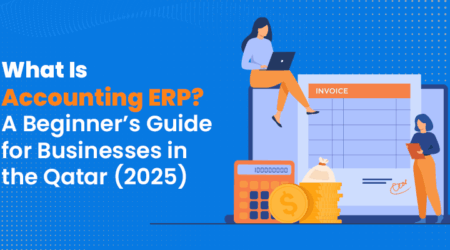
Leave a Reply